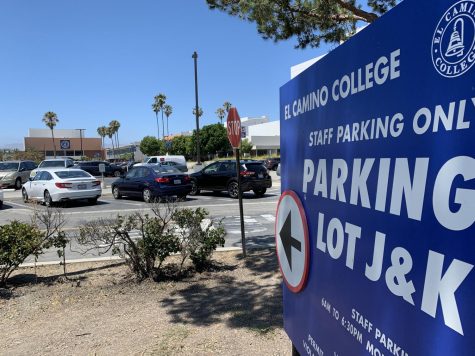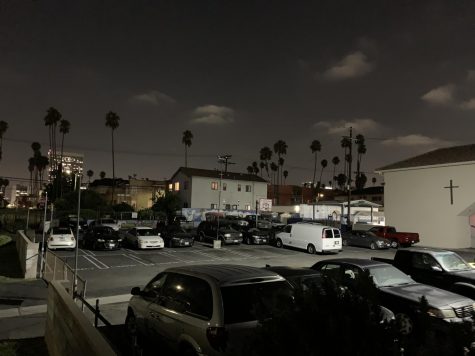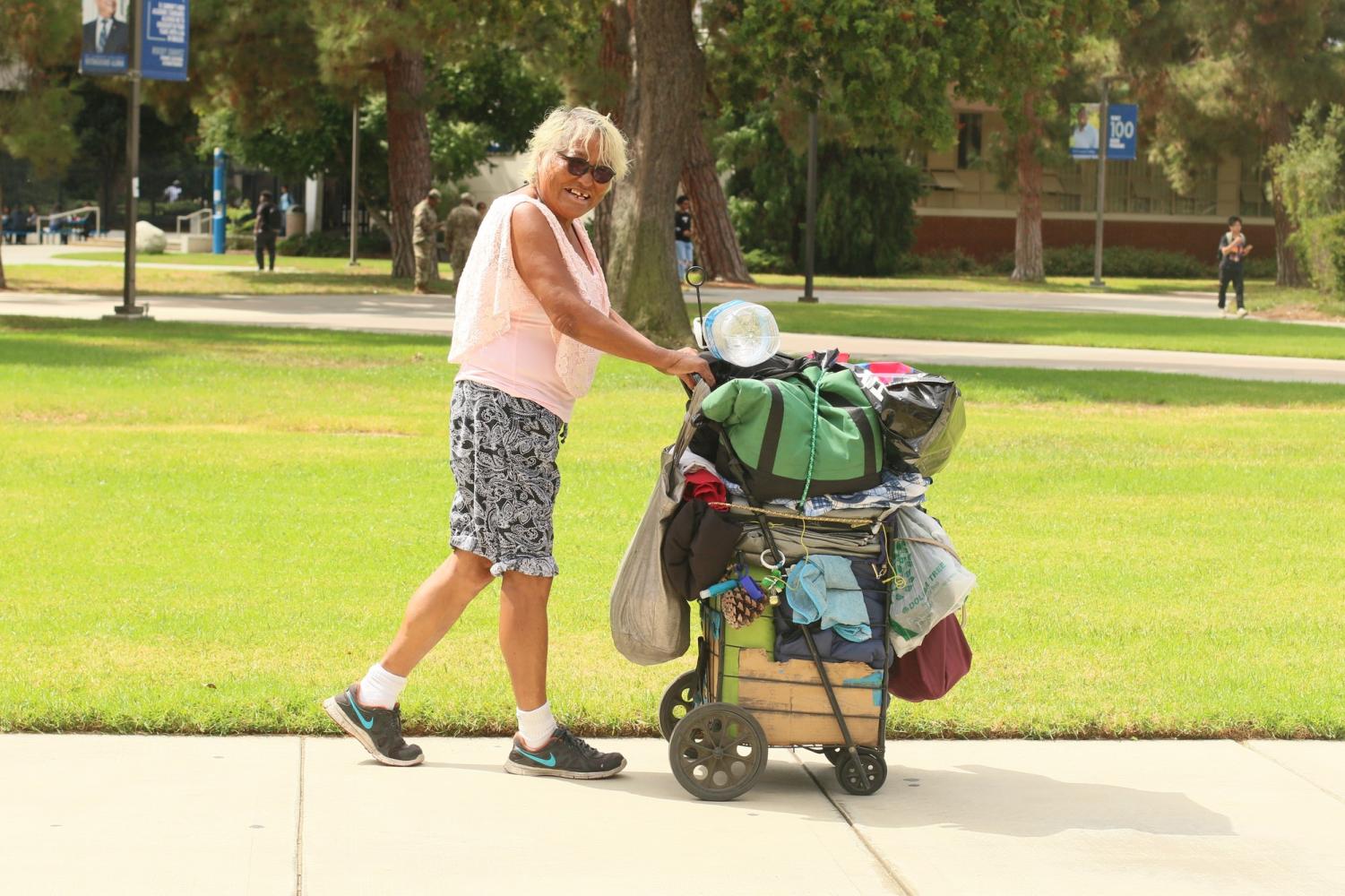Bill that gives homeless students place to sleep is ‘weakened’ by amendments
September 11, 2019
For 65-year-old El Camino College student Roxann Toshiko Tomiyasu, her car serves as the last refuge from the many dangers of being homeless and sleeping on the streets.
After she received her associate degree in arts as an automotive technology major at ECC last spring, Roxann was allowed to sleep in her vehicle overnight in one of the campus parking lots but was eventually asked to leave by campus police who cited safety concerns over wild coyotes.
Assembly Bill 302 (AB 302), also known as the safe lot bill, has been making its way through the California State Legislature. If passed, AB 302 would mandate California community colleges to allow homeless students to park their vehicles on campus lots and sleep in them overnight.
Tomiyasu told The Union she was hopeful the bill would pass because it could improve the living situation of ECC students impacted by homelessness.
Assemblymember Marc Berman (D-Palo Alto), the author of AB 302, has expressed dissatisfaction following a set of amendments made by the Senate Appropriations Committee (SAC) to the bill Friday, Aug. 30 and decided to place it on hold until the California Legislature reconvenes in January 2020.
Since AB 302 was first introduced in January, the bill received bipartisan support from state legislators and non-profit organizations and garnered opposition from dozens of community college districts, including the ECC District.
Berman said the idea for this legislation came from trying to find solutions to basic insecurities and homelessness among students in California.
As Chair of the Select Committee on the Master Plan for Higher Education in California, Berman held hearings in Sacramento, San Jose, Fresno and Riverside to gauge the issues impacting California college students.
“In every hearing, I heard from students about the struggles they were going through with the cost of living, with experiencing homelessness, food insecurity and lack of access to mental health services,” Berman said. “Those were the three main things, but housing by far was the No. 1 issue that I heard from students.”
While the long-term solution is to build housing, Berman said that he wanted to make way for a short-term solution to make the lives of students experiencing homelessness safer.
Berman added that instead of sleeping in their cars parked in alleyways or industrial parks, homeless students should at least have a safe place to sleep in their cars on college parking lots.
The emergence of the safe lot bill has also caused an increase in awareness of the student homelessness crisis and has destigmatized the issue, Berman added.
“A lot of times these students are embarrassed, they don’t want to talk about the troubles that they’re going through,” Berman said. “It’s our fault, it’s society’s fault that we haven’t built enough housing over the past 30 years and that the cost of housing is so high in California.”
AB 302 would require community colleges to create safe parking programs at their respective campuses, fashioned after successful models like Safe Parking LA, according to the Senate Judiciary Committee’s (SJC) legislative digest.
SAC amendments ‘weaken’ opt-out provisions
On Friday, Aug. 30, the SAC passed the safe lot bill with a 5-2 vote; its committee members also made three amendments to the legislation, which, Berman said via press release, heavily weakened the bill.
“I was sad to see the details of the amendments that were forced into AB 302 by the Senate Appropriations Committee, which indicate a lack of urgency in addressing the community college student homelessness crisis,” the press release reads.
Prior to SAC amendments, the AB 302 mandated California community college compliance by April 1, 2020, also known as the bill’s implementation date, and tasked colleges with forming a committee with student representation to create regulations for a safe parking program specific to a college’s respective community.
However, if colleges were to show the State of California proof by the implementation date that they offer three specific homeless student housing services—emergency grants for housing, rapid rehousing referral services, and hotel vouchers via a public agency—they would be exempt from having to comply with the bill.
The SAC amendments, which were added to the bill on Friday, Aug. 30, pushed back mandatory compliance to July 1, 2020, exempt colleges within 250 feet of an elementary school and changed the opt-out provision: if colleges provide one or more specified homeless student services—instead of all three of them—they would be exempt.
The new amendments, Berman said in his press release, indicate a lack of urgency to solve the student homelessness crisis.
In a survey by The Hope Center for College, Community, and Justice, which received responses from 40,000 community college students at 57 California community colleges, 19% of respondents said they experienced homelessness in the last year.
At ECC, the 2018 Student Campus Climate Survey received responses from 1,633 students, and revealed that 39% of students experienced housing insecurity and 13% experienced homelessness.

Concerned El Camino College officials
The EC District is joined by over 20 other community colleges and is one of over 40 entities that have expressed to the California State Legislature their opposition to AB 302.
ECC President and Superintendent Dena Maloney submitted a letter of opposition to the SJC on Wednesday, June 26 after consulting with ECC’s Board of Trustees and College Council. When asked if she talked with students or homeless students at ECC, Maloney said she had not.
While she appreciates the intent of AB 302, she does not agree with the approach it takes to remedy the issue of student homelessness, she told The Union.
“I think the approach kind of limits our thinking about what it is we need to be doing,” Maloney said. “It’s a very narrow and confined solution that doesn’t look at the bigger picture.”
In the early stages of the bill’s path through the state legislature, Maloney said she had a few concerns about the cost and liability brought on by the bill. Amendments made over the summer to provide relief for colleges from liability made Maloney happy, she added.
However, the costs that AB 302 would require community colleges to incur remains a concern for Maloney, she said.
“The Department of Finance estimates that this bill will cost $70 to $80 million for the state,” Maloney said. “With that level of a state investment, we should expect more, we should expect more out of the bill, we should expect more than parking lots for our students.”
While the California Constitution requires school districts to be reimbursed for state mandates, Berman said the process is not perfect and Maloney added that reimbursements are not usually the full amount.
AB 302 does not contain any language that mandates community colleges to come up with a permanent plan for housing while creating a safe parking program for students.
She added that there needs to be a better solution that puts students in housing, not cars and that an initiative driven by the California Community Colleges Chancellor’s Office (CCCCO) to define and create housing solutions for homeless students would be a better alternative than the safe lot bill.
In her letter to the SJC, Maloney called the bill a one-size-fits-all mandate that overlooks initiatives community colleges have already undertaken to address student homelessness.
Berman said the safe lot bill is not a one-size-fits-all mandate; it has provisions that allows colleges decide how a safe parking program should be run in its district.
“We want [safe parking programs] to be required, but we also want it to be as deferential as possible to the districts to tailor it to meet the needs of their individual districts,” Berman said.
Berman said he acknowledges that he is asking a lot from community colleges, many things that have never been asked of them before.
“I’m sorry that I am doing that but the housing crisis and the student homelessness crisis is so severe that we all have to step up and do more than we have before,” Berman added.
ECC’s efforts to address homelessness
At ECC, the Food and Shelter Task Force has met regularly since 2017 to address food and housing insecurity among students.
The Task Force consists of 31 members representing various programs and student services on campus like Extended Opportunity Programs and Services (EOPS), the Warrior Pantry and the Outreach School Relations office, among others; it is chaired by the Dean of Student Services Idania Reyes, who was unavailable for comment after The Union made multiple attempts to reach her.
The Director of Outreach and School Relations Julieta Aramburo, a member of the Task Force said the bill is a temporary fix that did not adequately solve the real issue students are confronted with in the South Bay, where affordable housing is lacking.
A document prepared by the Task Force for Maloney’s office providing legislative feedback on AB 302, found the price for an apartment in Torrance runs at $1,980 on average; only 1% of rental units cost less than $1,000 per month.
“There is no [affordable] housing in the South Bay that we can refer students to,” Aramburo said.
Often when referrals for housing are made, they are far away from EC, in cities like Whittier, Wilmington, and downtown Los Angeles, she added.
The Task Force document also designated parking lots J, K or L, to be used if AB 302 was passed and the college would have to comply with the bill, adding that the lots’ proximity to the El Camino College Police Department (ECCPD) and nearby restrooms made them the safest.
Overnight campus safety concerns
For ECCPD Chief Michael Trevis, his concern over safety involves having the manpower to provide adequate protection for homeless students participating in the overnight parking program, he said.
It’s safe to park on campus at ECC and parking-related issues are uncommon, he added.
“The only thing that concerns me is am I going to need more resources to ensure safety,” Trevis said. “I don’t know that yet.”
Another concern Trevis said he has is whether guests, mainly non-students, will be on campus overnight.
“I am concerned about the guests,” Trevis said. “I think a number of incidents and issues on campus involves non-students.”
Despite concerns over resources and the cost of a safe parking program at ECC, Trevis said he can also see how the bill can benefit students.
“I think the positive is those students that are living in their cars, if they are allowed to park here with the proper rules and regulations in place,” Trevis said. “I feel they would feel quite a bit safer than parking out in the streets somewhere.”
Feeling safer can give students confidence, which can translate into academic success, Trevis added.

Support from nonprofit parking program
The non-profit organization Safe Parking L.A. (SPLA), that supports AB 302, has been operating eight safe parking programs across Los Angeles City districts including Koreatown, West Los Angeles, and Hollywood, since 2016.
On average, SPLA serves between 125 to 150 vehicle dwellers (people living out their cars) per night, with plans moving forward to add an additional lot in Echo Park, Associate Director Emily Uyeda Kantrim said.
“Our job is to figure out how to model and how to make a safe parking program scale to serve the needs of 15,000 [homeless] people who are living in their cars and [to] assure the community that this is a reasonable way of addressing someone’s housing insecurity in a temporary manner,” Kantrim said.
Many of SPLA’s current sites belong to various governmental entities, including the Department of Transportation, the Department of Public Health, the Veterans Administration and Los Angeles County public libraries, Kantrim added.
“We have opportunities at city colleges that we don’t have at other places because we already have the parking lots that are not in use at night, with bathrooms, and security of some kind,” Kantrim said. “So all of the components of a safe parking program already exists.”
In terms of safety, Kantrim added that incidents involving crime have never occurred at safe parking lots because people parked in their cars overnight are only there to have a safe place to sleep.
Opposition from college association
The Community College League of California (CCLC), a statewide membership association for all 73 community college districts in California, opposes AB 302 because the bill was not voluntary and carried no funding to back it up.
President and CEO of the CCLC Larry Galizio said community colleges would be forced to bear the financial burden of an unfunded state mandate that could cost between $50 to $80 million a year to operate.
“It’s the incredible cost of housing in California, the first and foremost reason that somebody is homeless or housing insecure,” Galizio said. “And you’re mandating the under-resourced community colleges to solve a problem affecting the entire state.”
Community colleges across the state have been doing their share to address the food and housing insecurities among students, and attempts had been made by a few city colleges like Cyprus College who attempted a similar safe parking approach, Galizio said.
However, local ordinances limited their efforts, and neighbors rose up to disallow the attempt, he added.
Parking can lead to student success
For students like Tomiyasu, AB 302 can save them from the potential dangers of having to sleep in their cars located in unsafe areas, Tomiyasu said.
Before she was told she would have to find another place to sleep at night by the ECCPD, she said she felt safe sleeping on campus during the night.
Given the bill’s impact, Tomiyasu said she would like to see ECC officials be more open minded to its benefit.
“This is an opportunity for people to go to school, for people to get ahead in life, so why would [they] want to stop [AB 302]?” Tomiyasu said. “I hope and pray that it goes through with God’s strength. People need it. Some people don’t even have parents or families. It’s just one more step for them.”

